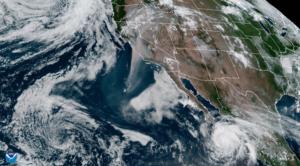Harry Cikanek, Director of the CUNY CREST Business Development and Entrepreneurship Pillar participated in the 2023 International Astronautical Federation (IAF) Global Space Conference on Climate Change (GLOC). Harry served in three roles; International Program Committee Co-Chair for Plenary Session; Lead Author on the High Level Summary Paper, and Moderator of the highlight lecture. The opportunity to give back to the community and foster greater impact motivated Harry to take on these roles.
The theme of this three day conference was Fire and Ice- Space for Climate Action and more than 4500 participants including space and non-space agencies, users, policy makers, commercial industry, philanthropies, and media, attended it. The objectives of the conference were to:
- Explore how to increase the use of space to enhance climate action
- Determine the effectiveness of the public engagement
- Evaluate ability to achieve societal benefits based on existing data and services
- Identify shortcomings and gaps
- Create a non-conventional conference – bringing together the space community and influencers from the outside
Participants during the Conference
(PC: International Astronautical Federation)
In his roles, Harry developed and organized the plenary and highlight lecture events and advised on Global Networking Forums, and as part of the overall leadership, helped shape the conference, including the process to collect outcomes. Harry said, “I point to two main highlights, first that the conference came together successfully, with well received programming and second, that we were able to synthesize actionable high level outcomes from 500 people meeting in various formats over 3 days.”
Following the conference, Harry led the synthesis of outcomes into the summary paper. Elaborating on what went behind publishing the paper, Harry said, “We had excellent IAF staff support to take the survey, compile and collect the data, and format it for analysis and synthesis. The main challenge was coming to consensus on what the most important outcomes to capture were and how to best organize them. There were many important outcomes that we did not have space to capture in the summary. This process started at the GLOC itself because there was a summary session, where we had to create an initial summary as the conference unfolded to convey in an hour long session towards the end.” Harry believes that the report represents an innovative approach to Global Conferences, tried for the first time with GLOC 2023. He added, “The success we had with this new approach offers a new path to gain more from such meetings. In the case of GLOC 2023, our aim was to convene on how to increase the contribution of space for climate action, and we came away with some very useful outcomes.”
Further, in his role as one of the Moderators of the Highlight Lecture of GLOC 2023 results at the International Astronautical Congress in Baku, Harry conveyed some of the memorable quotes from the Conference and the key points that were synthesized from the Conference outcomes. Harry commented, “What was fascinating was the rapidity and diversity of questions that we fielded once the lecture completed and we transitioned to questions and answers – showing high interest.” Some of the questions that the participants were curious about included– what were some of the not well known success stories, how does the space community communicate & what it does and can do for climate action, and how the space community relates to major contributors such as the oil and gas industries.
Ella Marie Hætta – sámi musical artist and climate activist opening GLOC 2023
(PC: International Astronautical Federation)
The International Astronautical Congress is the world’s largest annual gathering of the whole space community from across the globe including Agencies, Industries, non Governmental Organizations, and Academia.
Harry enjoyed working closely with the International Program Committee co-Chairs, the IAF Executive Director and staff, and the lead sponsor, head of the Norwegian Space Agency to develop the conference and document its outcomes. Commenting on his experience of the conference, Harry Cikanek said, “Traditional conferences focus on individual communities of practice or discipline, this conference was purposefully designed to bring in decision makers and leaders from outside the space community to create dialogue and learning. There was a high level of energy and commitment.”


